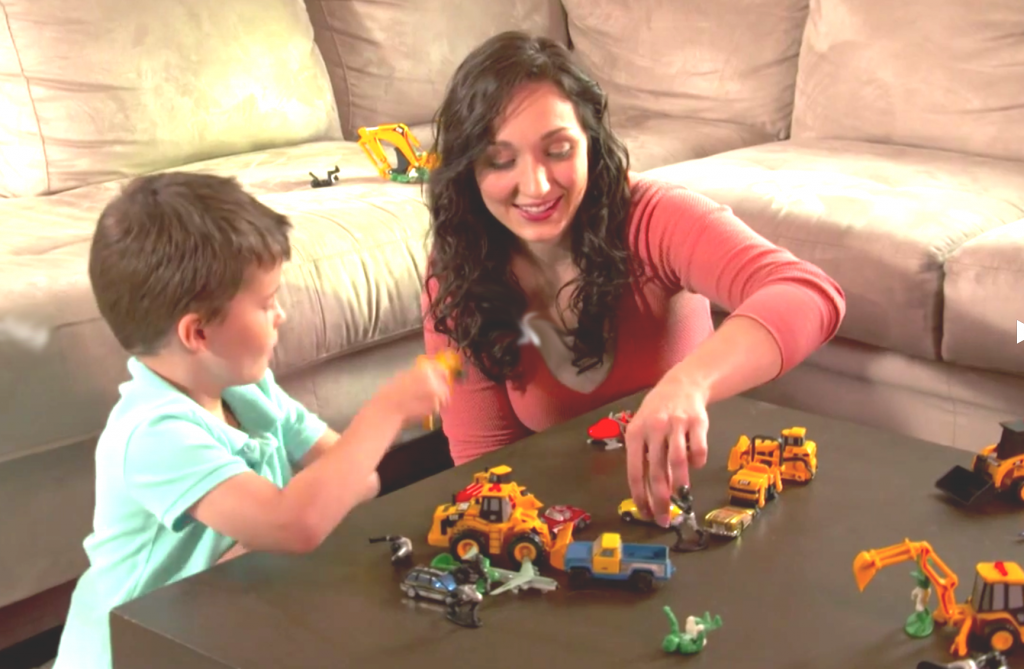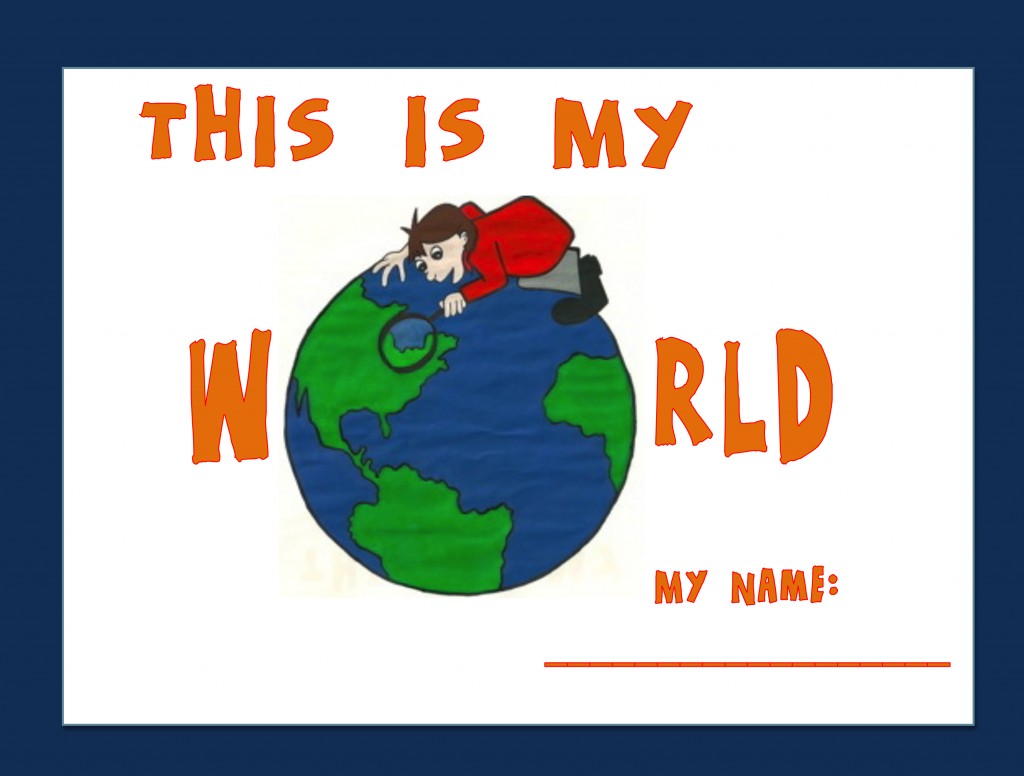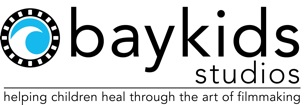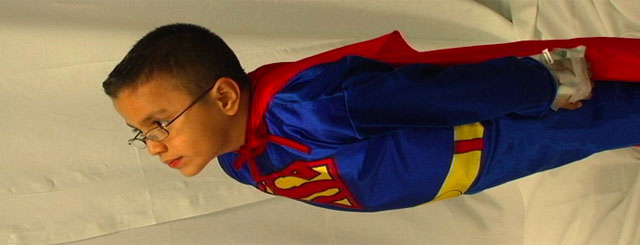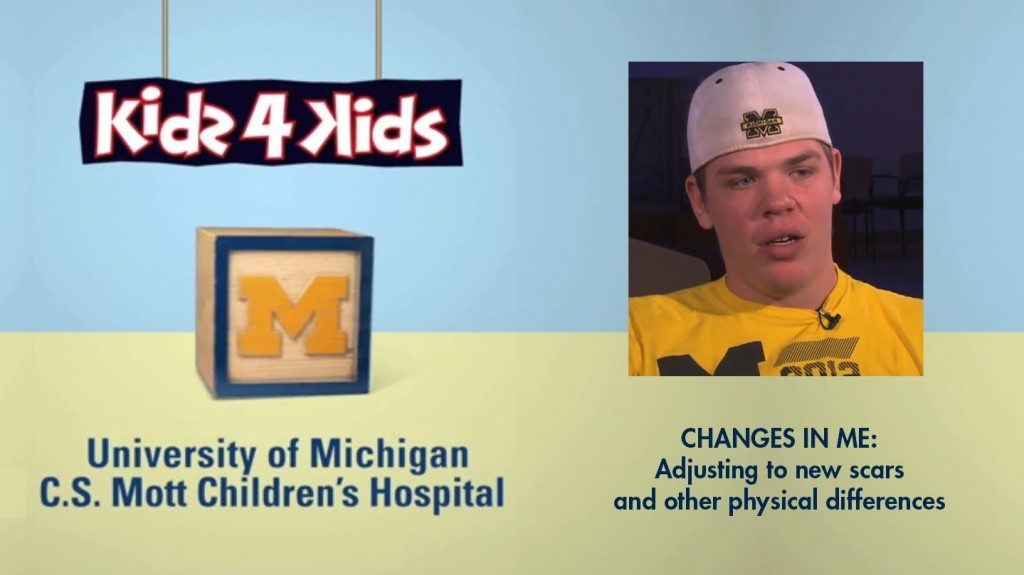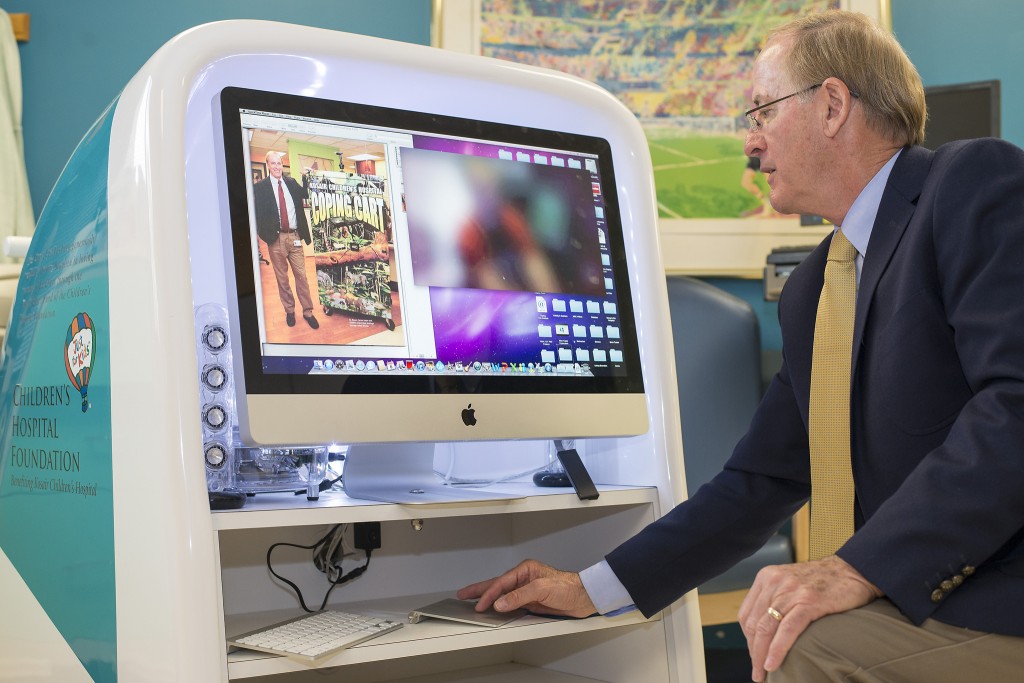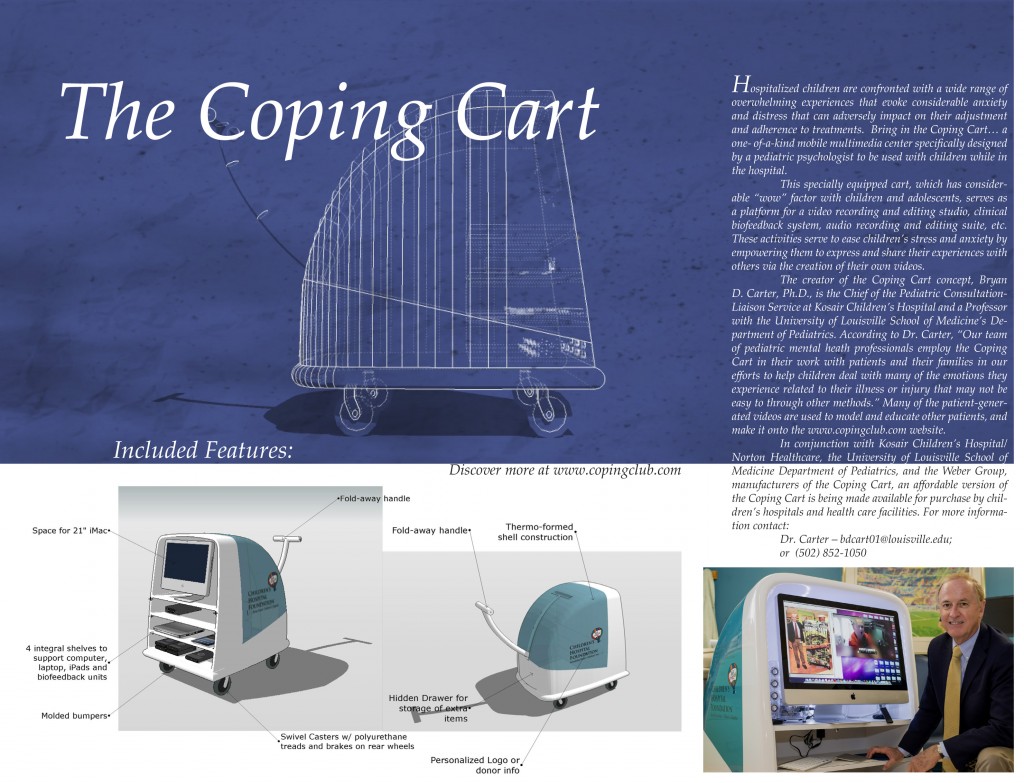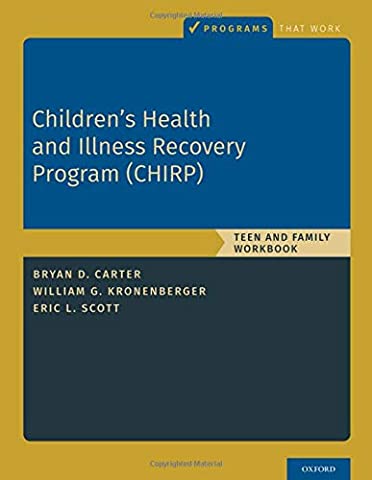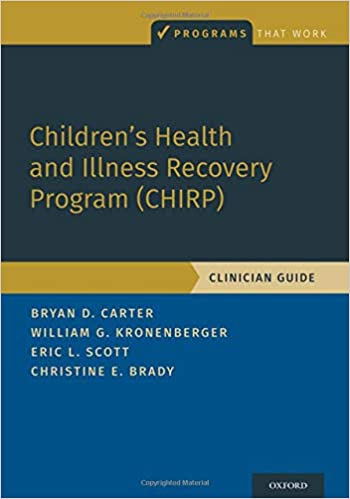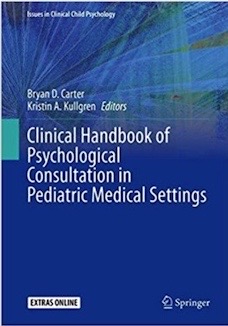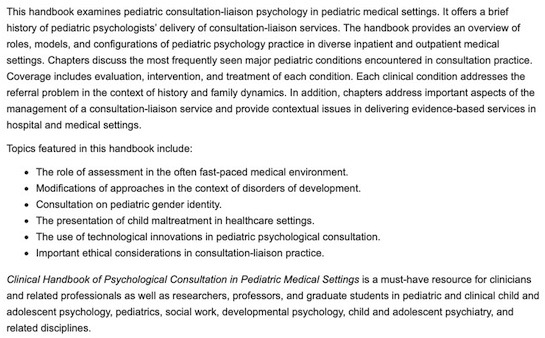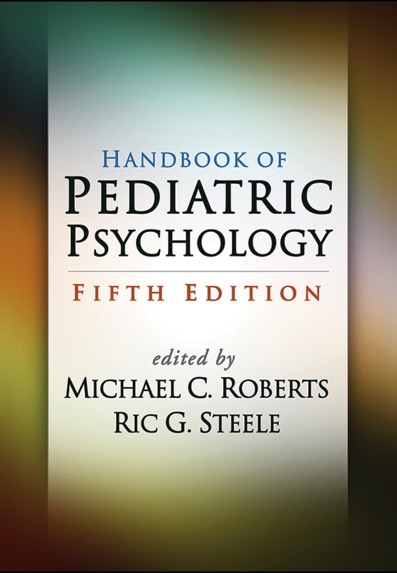Pediatric Psychology Resource Bank Downloads & Links (Click on the blue highlighted text to open/download/access the web link)
Distress Thermometer for Parents (DT-P) (Haverman) – The DT consists of Thermometer-score ranging from 0 (no distress) to 10 (extreme distress). Patients were instructed to tick the number that best described their overall distress. The DT is accompanied by a Problem List (a list of items to which patients are asked to respond either “yes” or “no”) and additional questions. On the Problem List, respondents indicate whether or not they have experienced any of the problems in the past week. The Problem List can be seen as a checklist utilizing dichotomous items (Yes or No) to indicate wants for help or the presence or absence of a need.The original DT is adapted for parents (DT-P) of a chronically ill child. The Problem List is adapted for use with parents. The Problem List for parents includes 6 domains: practical (7 items), family/social (4 items), emotional (9 items), physical (7 items), cognitive (2 items), and parenting (5 items for parents with a child younger than two years; 7 other items for parents with a child of two years or older). In addition, three total problem scores can be calculated; (1) the sum of all problem domains except child parenting; 29 items in 5 domains (range 0-29), (2) the sum of all problem domains including the parenting problem domain “younger than two years”; 36 items in 6 domains (range 0-36), and (3) the sum of all problem domains including the parenting problem domain “two years and older”; 34 items in 6 domains (range 0-34). Besides the Problem List, the DT-P also includes five additional questions, including questions about perceived support (yes/no) and wish for referral (yes/maybe/no). Functional Disability Inventory (FDI; Walker) – The FDI assesses activity limitations in children and adolescents with a variety of pediatric conditions.
KidCOPE(Spirito) – This is a self-report measure to assess coping styles in children. Click on each item to download the document.
- Kidcope-Scoring Instructions (Younger version)
- Kidcope-KC Younger Categories
- Kidcope-Scoring Multi items
- Kidcope-pitflalls
- Kidcope-sample scenarios
K-SADS-PL for DSM-5 (Kaufman; Kennedy Krueger Institute) This link provides access to downloadable paper-pencil versions of the screening and supplement forms of three web-based KSADS assessment tools: 1) a teen self-report KSADS; 2) a parent report self-administered KSADS; and 3) a clinician-administered KSADS. For more information about these tools, email joan.kaufman@kennedykrieger.org. The Kiddie Schedule for Affective Disorders and Schizophrenia (K-SADS) is a semi-structured interview aimed at early diagnosis of affective disorders such as including depression, bipolar disorder, and anxiety disorder. Moods and Feelings Questionnaire (2.08) – A thirteen item brief measure of affective distress in 7-18 year old children. Parenting Stress Measures – Provides a list of parenting stress measurement tools. Pediatric Inpatient Behavior Scale Instructions – (PIBS) (Kronenberger & Carter) The PIBS is an observer-report behavior questionnaire for children and adolescents during hospitalization on pediatric or psychiatric units. The PIBS-47 is a the original and more comprehensive version of the PIBS, and the PIBS-25 is the short-form of the PIBS. For more detailed information about the PIBS, please see the links below, starting with the “PIBS Scale Permissions and Use” document. PIBS manuals and forms are password protected and require permission of the scale authors for use. The PIBS is a psychological test intended for use only by qualified professionals. Before using the PIBS, you must agree to the “PIBS Scale Permissions and Use” document and obtain permission from the scale authors, William Kronenberger, Ph.D., and Bryan Carter, Ph.D., at wkronenb@iupui.edu. You will then be provided with a free password to open the files.
Pediatric Symptom Checklist (PSC) (Bursch) – The PSC is a brief assessment of dysfunction in major areas of a child’s daily life. As a clinical measure, it is the first step in what should be a multistage assessment procedure.
- PSC
- PSC+BB (Bursch Addendum for Inpatient Units)
- PSC-17
- INSTRUCTIONS – PSC+BB
- YPSC+BB Spanish 2013
- PSC+BB Spanish
- YPSC+BB 2013
Screen for Child Related Anxiety Disorders (SCARED) – The SCARED is a child and parent self-report instrument used to screen for childhood anxiety disorders including general anxiety disorder, separation anxiety disorder, panic disorder, and social phobia. In addition, it assesses symptoms related to school phobias. The SCARED consists of 41 items and 5 factors that parallel the DSM-IV classification of anxiety disorders. The child and parent versions of the SCARED have moderate parent-child agreement and good internal consistency, test-retest reliability, and discriminant validity, and it is sensitive to treatment response.
Screening Measures of Childhood Psychopathology – This is a superb compendium of free screening measures compiled by Mary Brahos under the supervision of Dr. Mary Fristad and Dr. Molly Meers with the Child Mood Disorders Lab at The Ohio State University, Department of Psychiatry & Behavioral Health.
Click to download: Screening Measures PDF
School Questionnaire (Hirsch) – This is a one-page but comprehensive set of items to be used in obtaining school-related information in the assessment of the child.
Transplant Psychosocial Evaluation Protocols – Templates and item categories to guide the conduct of pre-transplant psychosocial assessments for solid organ transplants in pediatric patients.
- Boston Children’s Pre-Transplant Evaluation Template
- CHOP Pre-Transplant Template
- Oklahoma Pre-Transplant Evaluation Template
Young Mania Rating Scale – Measure with background – The Young Mania Rating Scale (YMRS) is one of the most frequently utilized rating scales to assess manic symptoms. The scale has 11 items and is based on the patient’s subjective report of his or her clinical condition over the previous 48 hours. Additional information is based upon clinical observations made during the course of the clinical interview.

BUSINESS OF PRACTICE MATERIALS –
Psychotherapy coding clarifications, telemedicine code modifier added to CPT manual – (APA Practice Organization) – This document provides an update on definitions of telehealth and identifies telehealth codes.
Health & Behavior (H & B) Codes for Psychologists: A Working Manual Using Pediatric Obesity as a Model (Santos, Filigno, Gray, Ward, & Davis; Obesity SIG)
JPP 2012 Article on H & B Codes

FORMS & BROCHURES –
Behavior Contract (de-identified) (Brady) – This contract was developed to set behavioral expectations and guidelines for patients and families admitted for protracted hospital stays. This is intended to be used as a proactive tool rather than singling out more difficult families once conflicts or problems have arisen. Completion of this form upon hospital admission may lead to fruitful conversations reading potential barriers or areas of behavior that may be more difficult to manage.
Brochure-Belly-Breathing_NEW (Schneider & Carter)
Consultation Liaison Brochure (McMurtry)
Conversion brochure (McMurtry)
Generic Multi-Use Video Consent Form (Carter)
Medically Unexplained Symptoms brochure (CL SIG)
Neuropsychology brochure – (McMurtry)
Pediatric Chronic Pain brochure (Williams & CL SIG)
Selective Mutism (Children’s Hospital of Eastern Ontario)
Somatic Symptom Conversion brochure (Carpenter)
Traumatic Brain Injury brochure (McMurtry)
Understanding Your Child’s Conversion Disorder– Parent Handout (Caplan)

INTERVENTIONS & TREATMENT PROGRAMS –
AAP: Behavioral Health Interventions for Adolescents – Online Training Simulations – Provides two online interactive role-play simulations where health professionals build and assess their skills in having real-life conversation with adolescent patients about substance use and/or mental health concerns.
ADHD: Resources to Learn More About ADHD (Loren) – Provides a comprehensive list of reading resources for parents and children on ADHD.
ADHD Resources for Parents from the American Academy of Child & Adolescent Psychiatry – AACAP’s Facts for Families provides information that may be useful to families of children with ADHD.
Adherence: Mobile Technology to Improve Medication Adherence – This resource provides tools and opportunities for health care providers to help improve and assess patients’ medication adherence. With an increasingly mobile world where everything is connected, this resource provides information on the use of technology and the Internet to help improve medication adherence.
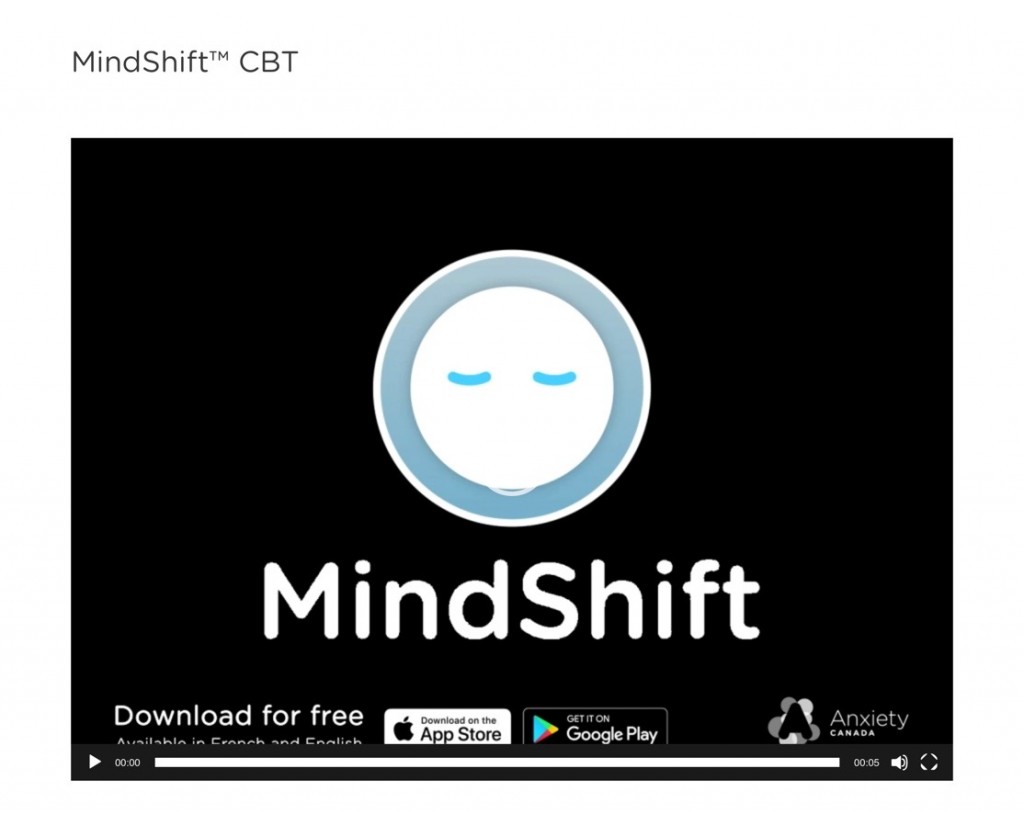
Anxiety Management: MindShift CBT – MindShift™ CBT is a free user-friendly app that employs evidence-based Cognitive Behavioral Therapy (CBT) strategies to teach relaxation and mindfulness skills while developing more effective ways of thinking and active anxiety management. The creators state that the user will acquire CBT tools that target skills at managing:
- Worry
- Panic
- Perfectionism
- Social Anxiety
- Phobias
Cancer: Cellie Cancer Coping Kit (Marsac & Vinsel) – To help children cope with their cancer diagnosis and treatment, psychologists at The Children’s Hospital of Philadelphia developed a special tool: the Cellie Cancer Coping Kit. The Coping Kit includes a stuffed toy named Cellie, cancer coping cards, and a book for caregivers. Cellie’s zippered mouth hides the deck of coping cards where children will find over 100 tips for dealing with numerous cancer-related stressors, such as medical procedures, hospital visits and feelings of fear and uncertainty.
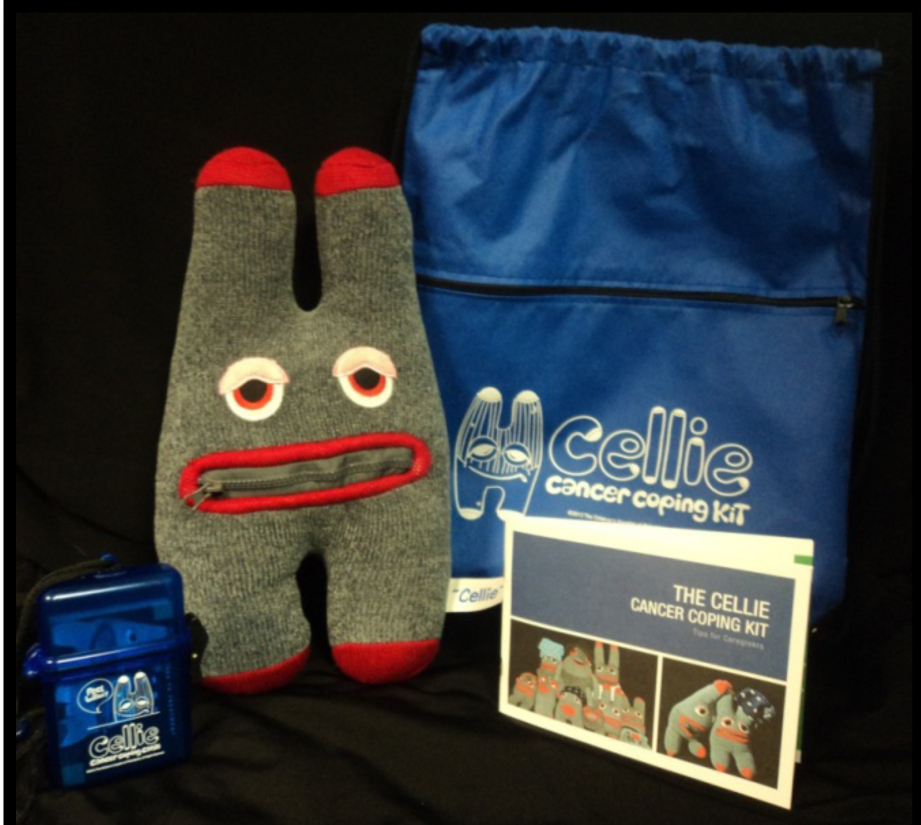
Children’s Health & Illness Recovery Program (CHIRP) – (Carter, Kronenberger, Scott & Brady) – CHIRP is an evidence-based 12-session manualized cognitive behavioral and family systems intervention for adolescents with chronic illness, particularly those pediatric health conditions that involve chronic pain, fatigue and functional disability. It can be conducted in either individual/family or group (teen group and parent/guardian group) format. NOTE: Beta versions of the CHIRP TEEN & FAMILY WORKBOOK and CHIRP CLINICIAN HANDBOOK are no longer available on the RESOURCE BANK. The CHIRP books are now available from Oxford University Press in their Treatments That Work series. They can be ordered by clicking on the CHIRP book title: CHIRP Clinician Guide: The CHIRP Clinician Guide provides the manualized session-by-session psychosocial interventions for this evidence-based treatment for improving independent functioning in adolescents with chronic illness. CHIRP Teen and Family Workbook: The CHIRP Teen & Family Workbook consists of the in-session and homework exercises that drive the psychosocial interventions with teens and their parents/guardians. CHIRP-related Videos: Clink on the link below to go to the YouTube channel (“Chirpy Carter”) that provides the users of the CHIRP intervention with illustrative videos that accompany the session-by-session homework activities. CHIRP Videos to accompany session-by-session workbook activities
Choking Phobia Inpatient Protocol – These forms (with reference and video examples) can be used in setting up a 2-3 day inpatient program for children with a severe choking phobia. – (Carter)
- Choking Phobia Inpatient Protocol Form
- Meal-to-Meal RECORD
- Victoria’s Victory over her Choking Phobia (Video)
- Maddie Overcomes her Fear of Choking (Video)
Camp Cope-a-Lot –
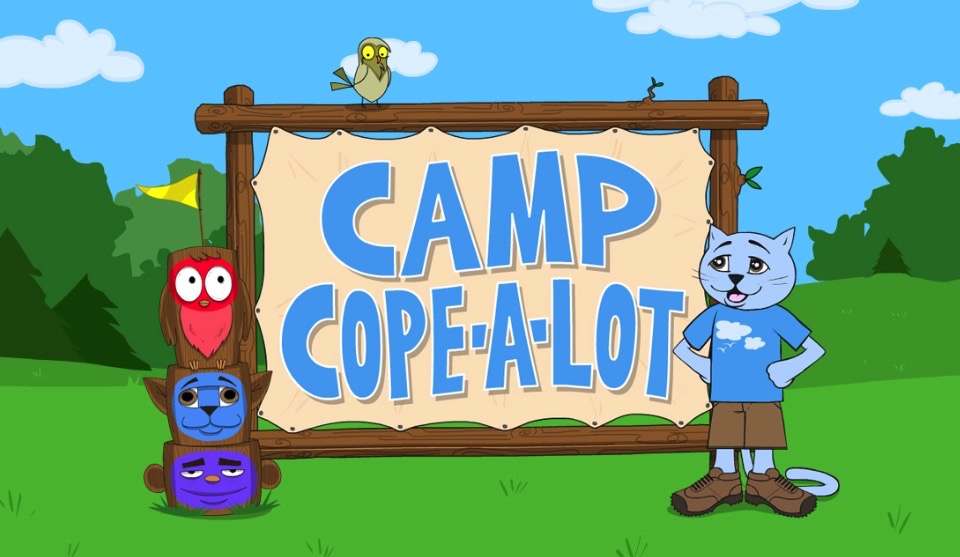
Philip C. Kendall, Ph.D., ABPP & Muniya Khanna, Ph.D. Temple University & The OCD & Anxiety Institute
Camp Cope-A-Lot is a 12-module online program for use with children suffering from anxiety. The computer program provides cognitive behavioral therapy techniques (based on the Coping Cat treatment) for 7 to 13 year old children and teens struggling with anxiety and stress. Child users advance on their own and at their own pace through the first 6 sessions, and through the last 6 sessions with coach (therapist or parent) guidance. Along with other campers at Camp Cope-A-Lot, the child goes to an amusement park, puts on a talent show, meets someone new, speaks in public, sleeps in the dark, and experiences other adventures. Ideal for use in multiple settings, including schools, community, private, hospital or training clinics, etc. Advantages include:
- No formal training in cognitive-behavioral therapy required
- Requires fewer therapists hours (approximately 6 hours per child for the 12 sessions)
- Includes a selection of videos of other children engaging in exposure tasks and using coping strategies
- Comes with printable Go-To-Gadget (child workbook)
Delirium –
Pediatric psychologists in the inpatient pediatric medical setting are often consulted to evaluate and address concerns with patients with altered mental status. Dr. Brenda Bursch of UCLA has assembled a useful set of resources and tools for assessing and intervening with these patients.
Pediatric Delirium: A Practical Approach
Pediatric Confusion Assessment Method for the Intensive Care Unit https://www.icudelirium.org/medical-professionals/pediatric-care
Useful Research Abstracts About Benzos (Bursch)
Cornell Assessment of Pediatric Delirium https://www.chop.edu/clinical-pathway/picu-pcu-delirium-clinical-pathway
Diversity Interventions
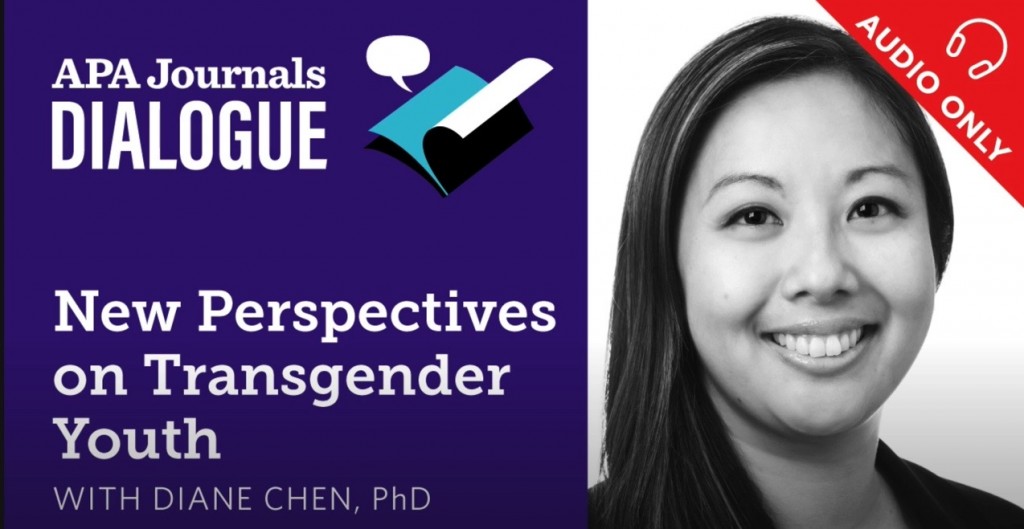
Divorce Coping Resources –
Divorce: Emery About Children & Divorce (Emery) – Dr. Emery is a major researcher on the effects of divorce on children and families. This website provides a wealth of information for professionals and parents of value in helping navigate the stressful process of divorce and coping. Topics covered on this website include:
- How Divorce Affects Children
- Planning for the Holidays
- Children’s Bill of Rights in Divorce
- Custody Evaluations
- Parenting Plans (Custody Schedules)
- Staying Together for Children
- Emery’s Divorce Mediation Study
- Grieving Divorce
- Excerpts from The Truth
Divorce: Tyler’s Tips for Kids and Parents Coping with Divorce (video) – Wise words from a 10-year-old coping with parental divorce (from the Coping Club website – www.copingclub.com).
Eating Disorder Care Protocol – (Tsang)
- Eating Disorder Care Pathway (Download)
GRIEF AND LOSS

Gilbert’s Feathers (Wiener) – Serious illness in a family can cause many emotions like worry, fear, or sadness. Whether a child is experiencing the illness or a loved one is ill, children need the opportunity to talk about their feelings. The Gift of Gerbert’s Feathers explores how a family supports young Gerbert, as he experiences a serious illness, and how Gerbert finds a way for his family to remember him when he’s gone. Hear the authors read The Gift of Gerbert’s Feathers aloud and see three activities related to feathers.Read two posts from the authors about helping siblings cope with grief and helping children with serious illness talk about their feelings. Read the Note to Parents and Caregivers from The Gift of Gerbert’s Feathers, the Kids’ Reading Guide, and access a feather coloring sheet.
Grief: Adolescent Grief and Loss Workbook (Hunter) – This is a beautifully illustrated downloadable workbook that can be employed with children and adolescents dealing with grief and loss.
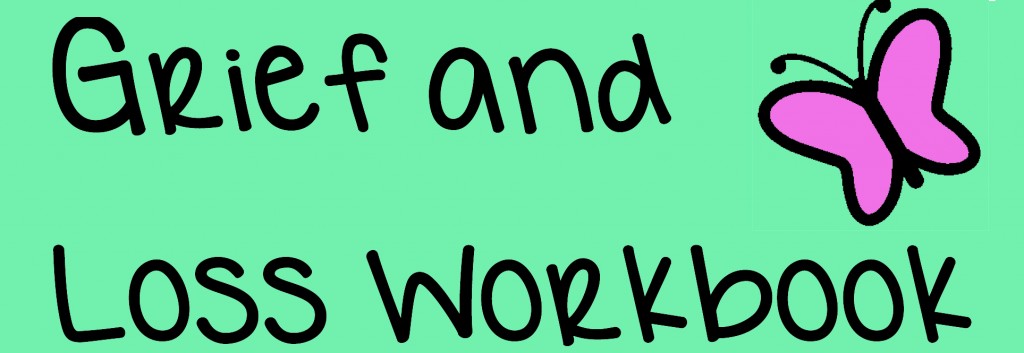
“Life is a process of loss, change, and growth. Understanding loss issues can make them more predictable and therefore less frightening. Through grief we can grow in inner and outer strength, and healing can take place.” – Dr. Linda Goldman
Grief and Loss Child Resources (Goodman)
Grief: Bereaved Children & Caretaker Resources (Goodman) – This resource provides a list of resources for parents, children, siblings, teachers, etc., on the topic of grief and loss.
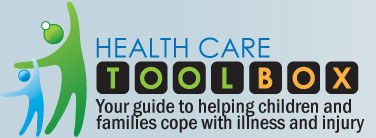
This website offers pediatric health care providers resources and guidance on adopting a trauma-informed perspective on patient care. The site explains the impact of traumatic stress reactions in children coping with illness, injury, and medical procedures; provides tools that can help health care professionals enhance their skills; and includes patient education materials in English and Spanish that can be downloaded and shared with clients. This site is developed and maintained by The Center for Pediatric Traumatic Stress at Children’s Hospital of Philadelphia.
Model for a Consulation Clinic (Thompson)
Medically Unexplained Physical Symptoms (MUPS – An Introduction (Caplan) – The MUPS protocol (Medically Unexplained Physical Symptoms)was developed as a quality improvement initiative to improve communication with families and patients about medically unexplained physical symptoms. It is being continually revised and improved and we would appreciate feedback from those who download and use the protocol. Please contact Alli Allmon (allison.allmon@imail.org) or Dedee Caplin (deirdre.caplin@hsc.utah.edu) with any questions you may have or to give us feedback on this protocol as we continue in our efforts to improve it.
- MUPS – Contributing Factors to Your Physical Symptoms
- MUPS – Flowchart for MUPS Teams-1
- MUPS – Strategies and Scripting Explanations
- MUPS – Care Process Model In Detail and At-a-Glance
- MUPS – Cover Letter Draft to physician
- MUPS – Understanding Functional Somatic Symptom Disorder– Parent Handout
- MUPS – Understanding Functional Neurologic Disorder– Parent Handout
- MUPS – Understanding Your Child’s Pain Disorder– Parent Handout
- MUPS – Medical Team Handout
- MUPS – Illness Experience Diagram
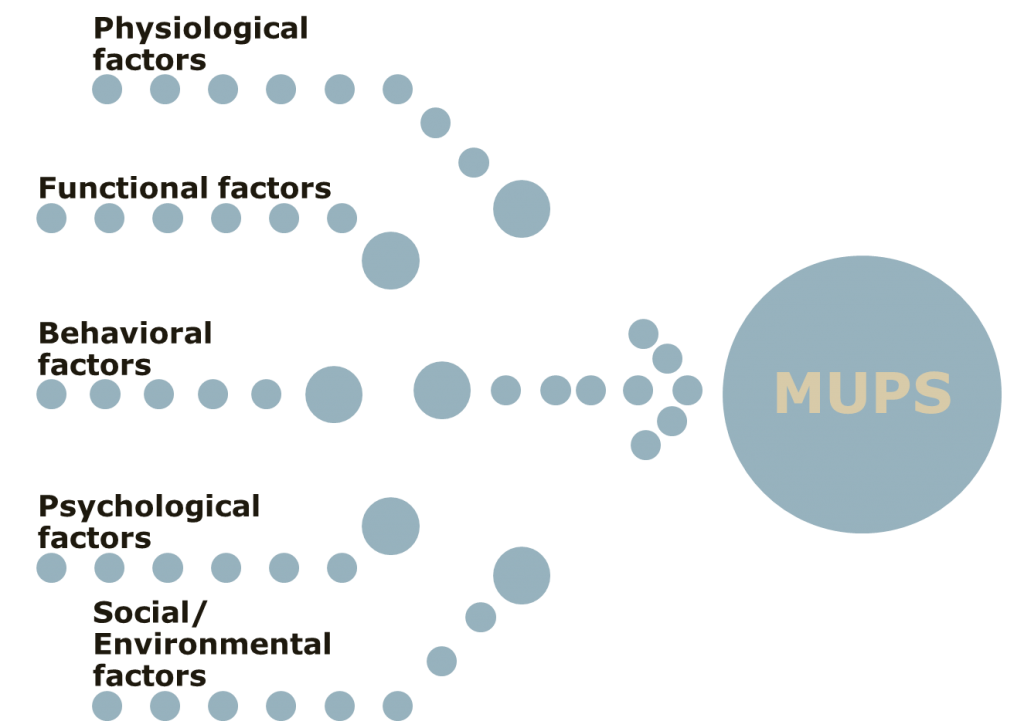
Mindfulness for Kids
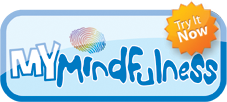
This is a website for kids teaching mindfulness principles to youth, and established by the Cheshire and Wirral Partnership NHS Foundation Trust Child and Adolescent Mental Health Service in the United Kingdom.
Below is a meditation, approximately 5 minutes in length, that teaches children mindfulness by helping them bring their attention to body sensations, their breathing, and their emotions. Appropriate for children ages 5 and up. This video is one in a series. For more meditation videos go to bkmindbodywellness.com. https://www.youtube.com/embed/shR8DLyOkcg
Mindfulness for Teens – This website includes downloadable mindfulness and guided imagery exercises intended for use in working with adolescents.
Mindfulness for Children (Harris) – Annaka Harris is an editor and consultant for science writers. She is author of the children’s book, I Wonder, anda volunteer mindfulness teacher for InnerKids. This website provides a number of mindfulness activities, including a downloadable audio recording and access to instructive games, intended for use in teaching mindfulness skills to children.

Pain Interventions –
Pain: Acute Procedural Pain Toolkit (Chambers) -The interventions in this program are designed to improve health outcomes for infants and children by reducing pain experienced during medical procedures, healthcare interventions, and both acute and chronic conditions, disease or disability.
Pain: Pain Bytes (NSW Agency for Clinical Innovation, Australia) This website is designed to help youth and their parents gain a better understanding chronic pain. The site contains information to enable skill development and knowledge in the self management of pain and functioning in partnership with healthcare providers.
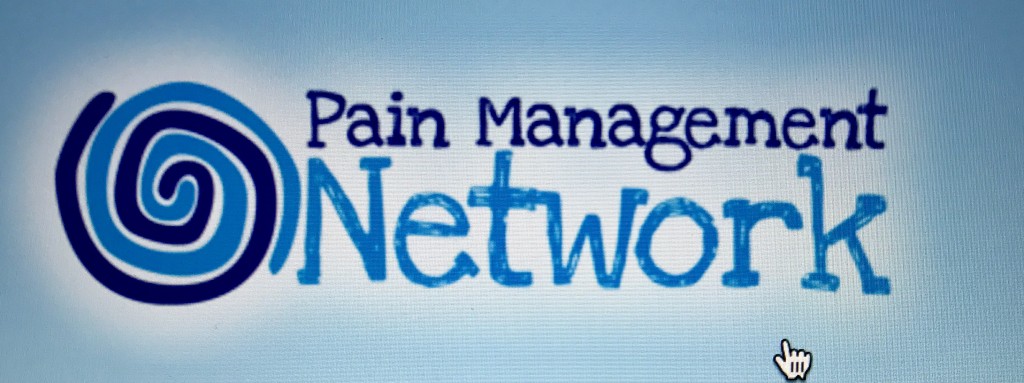
Pain: It Doesn’t Have to Hurt: Strategies for Helping Children with Shots and Needles. (Chambers) How many times have your kids been upset about going to the doctor because they’re afraid of the pain that goes along with getting a needle? Every parent (and health professional) wants to know how getting a needle can be easier for everyone. It doesn’t have to hurt: Strategies for helping children with needles is a resource for parents and health professionals to help make the experience less stressful and painful. And the best news? These tips are all backed by scientific research Download the Booklet: Learning to Live with Chronic Pain ImaginAction is a skill that uses our natural ability to focus and be absorbed in experiences to help feel better in some way. You already know how good it can feel to get lost in a movie, or a good book, or a cool video game. ImaginAction just helps you do the same thing on purpose so can feel better or different when YOU want to. https://player.vimeo.com/video/363348899 ImaginAction is part imagination, because it is something you do in your brain using your awesome creativity and natural ability. But it’s also part action, because it literally changes your experience in your body and how you feel. Another name for it is self-hypnosis. Pain Clinics & Programs List (Palermo) This is a comprehensive list, updated annually, providing a brief description and contact information for multidisciplinary pediatric pain programs and facilities across the country. Pain Clinic List – updated for 2018 (Palermo) Pain: The German Pediatric Pain Centre – Videos on Migraine Headaches for Children and Chronic Pain Processing in the Brain (Zernikow) This is the English version of three creatively animated educational videos on chronic pain in children and adolescents. The first video is titled “Migraine: How it works and how to get it under control!” The second video is an animated treatise on“Understanding pain and what’s to be done about it… in ten minutes.” The third video is titled“Pain processing in the brain: What is different in chronic pain?” https://www.youtube.com/embed/JrCdyuDsg6c https://www.youtube.com/embed/KfYC6zfrV80 Pain: Special Interest Group on Pain in Childhood – This is the website for the Childhood Pain SIG for the International Association for the Study of Pain Your child and chronic pain: How to ‘dial down’ the agony – This is an excellent Washington Post feature written by Boston Children’s Rachael Coakley, PhD, focusing on chronic pain in children and ways parents can help ease that pain in their children. Pain Videos Relaxation Workbook (Caplan; Primary Children’s) WebMAP (Palermo; Seattle Children’s Hospital) – What is WebMAP? WebMAP Mobile is a program for teens who have problems with chronic pain like headaches, abdominal pain, or back pain. WebMAP Mobile is designed to help teens cope with pain and increase their ability to do things that are important to them. In this program, you will learn different behavioral and cognitive skills for managing pain and for doing more activities that you want to do. You are going to be traveling through awesome destinations during the program. It takes about 6 weeks or so to go through all of the destinations; however, you can use this app and the skills recommended for as long as you need to. Each of the places that you visit will teach different skills to help you manage your pain. You will also keep track of your symptoms and progress, and complete assignments to help you practice new skills. You will work on each assignment for a few days before you move onto the next place. Who created it? WebMAP Mobile was created by Dr. Tonya Palermo and her team at the Seattle Children’s Research Institute. The team is composed of health professionals and researchers with experience in e-health treatments for pain in youth. The software was developed by 2Morrow, Inc. a company specialized in mobile behavior change interventions. The contents of the program have been adapted from a successful online pain treatment program called WebMAP, which stands for Web-based Management of Adolescent Pain, which teens could access on a computer through the internet. You will get the most benefits if you follow the instructions and use the app daily. However, the effectiveness may vary from person to person. If you find that your pain is getting worse or you have any unexpected problem, please consult with your doctor before you continue using the app. Relaxation: Belly Breathing Relaxation: Relaxation & Guided Imagery – These relaxation and guided imagery videos were produced by Dr. Allison Fernandez (Director of Pain Medicine at Johns Hopkins All Children’s Hospital in Florida) for use with children (12 years and older), as well as for parents and staff. Sleep Interventions Sickle Cell Protocol (Frigon; Montreal Children’s Hospital) Tic and Tourette’s – This website has links to patient and parent handouts and very helpful talks by Dr. Doug Woods about Comprehensive Behavioral Intervention for Tics (CBIT). Trauma: Trauma-Focused Cognitive-Behavioral Therapy Training Website (MUSC) Trauma-Focused Cognitive-Behavioral Therapy (TF-CBT) is an evidence-based treatment for children and adolescents impacted by trauma and their parents or caregivers. This is the official TF-CBT National Therapist Certification Program website, in which clinicians can become certified in the TF-CBT treatment model. Trauma: The Center for Injury Research and Prevention (CHOP) This website has parent educational handouts for helping kids/adolescents cope with injury in the hospital and outside of the hospital. Handouts are available in English and Spanish. Trauma: The National Child Trauma Stress Network This website was created by Congress in 2000 as part of the Children’s Health Act to raise the standard of care and increase access to services for children and families who experience or witness traumatic events. This unique network of frontline providers, family members, researchers, and national partners is committed to changing the course of children’s lives by improving their care and moving scientific gains quickly into practice across the U.S. Trauma-Related Grief (NCTSN) – Provides information on the signs, symptoms, and treatments for childhood traumatic grief for Mental Health Professionals and Providers, as well as resources for children and family members. Trauma: After the Injury – This website helps parents and caregivers understand children’s reactions to injuries, and advises them on how they can help children respond in healthy ways. Visitors can download tip sheets, make care plans, consult self-care resources, and learn when—and how—to get additional help for their children. This site is developed and maintained by The Center for Injury Research and Prevention at Children’s Hospital of Philadelphia. Trauma’s Impact on Children Exposed to Violence (OJJDP – Office of Juvenile Justice and Delinquency Prevention) – This website is a product of OJJDP’s national campaign that seeks to raise awareness, teach skills, and inspire public action to address children’s exposure to violence and the resulting trauma. PARENTING RESOURCES – Dr. Michael Rapoff defines adherence and reviews techniques that parents can use to help their children follow through with doctor-recommended treatment plans. Michael Rapoff, Ph.D. is currently Ralph L. Smith (Distinguished) Professor of Pediatrics, Vice-Chair for Research/Scholarship, and Director of the Faculty Mentoring Program in the Department of Pediatrics at the University of Kansas Medical Center. Effective Discipline/Behavior Management – Oregon Health & Sciences University – (Riley) – These short videos, which can be used in a variety of clinical and educational contexts, illustrate effective parenting approaches to a variety of early childhood behavioral challenges. Also includes are supplemental parenting handouts. These are from Project BeHave, Andrew Riley, Ph.D., Oregon Health & Sciences University and Doernbecher Children’s Hospital. Figuring out Frustration (video) Reworking Rewards for Success (Video) Supercharging Playtime (Video) Tools for Effective Time-out (Video) Giving Great Instructions (Video) Handouts – Figuring Out Frustration; Giving Great Instructions; Paying Attention, So Attention Pays Off; Power of Praise; Rewards; Supercharging Playtime; Tools for Timeout Gottman Institute – Provides resources for parenting from the work of John Gottman, Ph.D. Parenting Videos from the CDC (targeted to parents of toddlers and preschoolers) – This list provides links to 11 videos, produced by the US Centers for Disease Control and Prevention, teaching parents basic parenting techniques. Sexuality: Gender and Sexuality Identity Clinic at CHOP – This program offers medical and psychosocial support for gender variant, gender non-conforming and transgender children and youth up to 21 years of age and their families. They also provide consultation and training for providers and organizations interested in learning how to serve the needs of gender variant youth. ShopTalk(Wiener) – ShopTalk is a therapeutic game designed for children living with cancer or another serious illness.It was created by Drs. Cindy Mamalian (an artist and psychologist) and Lori Wiener to help therapists lead conversations with pediatric patients about difficult emotional issues related to the illness that has affected their lives (ages 7 to 16 years). ShopTalk players visit 10 different “shops” around the board, choosing one of 6 “gifts” from each store to place in their individual shopping bag when they choose to answer the question. The shops are named according to different themes: The Ball’s in Your Court sports store, for example, allows players to explore how they would respond to various social scenarios during treatment. ShopTalk is available in three versions, one for pediatric cancer patients, one for their siblings, and one for children whose parent have cancer. All questions in both versions of the game are written in Spanish as well as in English. Therapists who are interested in obtaining a copy of the game should contact Dr. Wiener directly at wienerl@mail.nih.gov. This is My World – This is a workbook designed as a therapeutic tool for use with children and adolescents with a chronic and/or potentially life threatening illness (Wiener) PEDIATRIC PSYCHOLOGY PRACTICE: EXPLAINING TO CHILDREN AND PARENTS WHO WE ARE AND WHAT WE DO Video – Kira, a thirteen-year-old with a heart condition (dilated cardiomyopathy) turns the camera on her pediatric psychologists and asks what they do to help kids and families in the hospital. Video – In the following video, several pediatric psychologists discuss their approach to patients and families in helping them understand the role of the psychologist as part of the multidisciplinary team in assisting the child and family in adapting to their medical condition and the maximizing their quality of life and functioning. ONLINE RESOURCES – BayKids Studios – BayKids was founded with the goal of offering new and innovative ways to empower children facing medical challenges through fostering self-expression via multimedia programs designed to teach kids how to create websites, animated shorts, narrative films, documentaries, music and art. Working in partnership with Children’s Hospital and Research Center Oakland and UCSF Benioff Children’s Hospital, our digital filmmaking programs provide kids with the opportunity to explore their creativity while learning filmmaking, teamwork and leadership skills. The films on this website are driven by the children’s creative visions and unique perspectives by providing them with the opportunity to make a variety of different types of movies, each of which offers unique benefits. Coping Club Video Website (Norton Children’s Hospital – Louisville; Carter) www.copingclub.com – This website, which is sponsored by Norton Children’s Hospital (formerly known as Kosair Children’s Hospital) and Norton Healthcare, consists of a wide variety of “kids-helping-kids” patient-made videos dealing with diverse aspects of coping with chronic childhood illness, traumatic injuries, hospitalization, procedures, coping strategies, etc. Many of the videos are useful for viewing by children facing such challenges as taking oral medications (pill swallowing), getting an i.v., getting chemotherapy, testing blood glucose levels, acupuncture treatment, coping with hospital stays, to name just a few. There are also videos teaching pediatric patients coping strategies such as diaphragmatic breathing, guided imagery, progressive muscle relaxation, cognitive therapy, etc. New videos are uploaded periodically to increase the breadth of this practical and useful library. We have also partnered with CS Mott Children’s Hospital (see below) and Riley Hospital for Children in linking their videos to Coping Club, for easier access to a growing library of kids-helping-kids videos. CS Mott Children’s Hospital Kids4Kids Peer Education Videos – (Kullgren) The CS Mott Children’s Hospital Mott Kids4Kids (University of Michigan School of Medicine) peer education videos are made for-kids-by-kids to help chronically ill youth and families navigate the challenges they face. The videos can be accessed at the weblink below, as well as on the www.copingclub.com website as part of our collaboration with Norton Children’s Hospital (University of Louisville School of Medicine). The videos cover the following topics: (1) Changes in me: coping with the physical changes of illness or injury; (2) I get by with a little help from my friends: Seeking social support; (3) School crossing: Coping with school and school re-entry; (4) Stick to it: Medication adherence (5) Ouch that hurts!: Pain coping; (6) Taking care of business: Teen advocacy and transition to adult care; (7) That’s my brother/sister: Sibling coping; (8) What just happened: Parent coping with new diagnosis or illness; (9) Welcome to the club: General advice for parents from parents; (10) Oh the help you’ll find: General support suggestions; (11) Keeping it real: Coping with illness/hospitalization. These videos can also be accessed via the www.copingclub.com website. Pediatric Psycho-Oncology Professionals resource website – (NCI) This National Cancer Institute (NCI) site, for Pediatric Psycho-Oncology Professionals (PPOP), was created with two main goals: 1) to stimulate international communication among professionals with a diversity of clinical and research backgrounds in order to foster collaboration in clinical care, research and education that relate to pediatric psycho-oncology, and 2) to develop a comprehensive list of resources, training opportunities, ongoing research, and upcoming events in the field of pediatric psycho-oncology. Our hope is that this website will provide information which will guide professionals in providing the highest quality of care to youth with cancer and their families. REFERENCES & RESOURCES FOR PATIENTS, PARENTS and PROFESIONALS – Autism: Small World Special Needs – Small World Special Needs.org, is a multi-cultural resource hub for people helping children with special needs to share resources and information. This site was created for families, educators, clinicians, therapists and friends in Philadelphia PA, USA and beyond to make it easy for others to find out how to help a child with special needs to learn how to do things that will improve their quality of life. This is a non-profit resource that promotes evidence-based information. Digging Deep: A Journal for Young People Facing Health Challenges – Digging Deep inspires children and teens with serious illnesses to express themselves and tell their own personal story – empowering them through introspection and journaling to findhope, courage, and inner strength. Info about kids – This is a helpful website, sponsored by APA, for parents to get information on various child-related topics. Genetic Disorders in Children: Information for Parents – This UK website provides information to parents of children diagnosed with major genetic disorders. http://www.geneticdisordersuk.org/parentsofaffectedchildren Grief Related Resources for Professionals & Families (Goodman) Effective Mental Health Care for Children – This APA Division 53 video-based website was created to provide parents and caregivers with guidance in finding effective evidence-based treatments for their child with a behavioral or emotional disorder. ONCOLOGY – Psychosocial Standards of Care in Pediatric Oncology published in a special issue of Pediatric Blood and Cancer.(http://onlinelibrary.wiley.com/doi/10.1002/pbc.v62.S5/issuetoc) PANDAS Network – Pediatric Autoimmune Neuropsychiatric Disorders Associated with Strept. This is a useful website to educate families about this syndrome. Resources for Telling Children about Parental Illness (Duncan) Teen Dating Violence – Resources, including videos, focused on prevention of teen dating violence. (Discussion Points on the Teen Dating Violence Video) SELF-CARE FOR THE CLINICIAN – Clinician Well-Being Knowledge Hub – The link below gives clinicians access to the National Academy of Medicine’s Resource Toolkit TECHNOLOGICAL INNOVATIONS (Apps, Biofeedback, Digital Devices, etc.) Apps for iPhones, Smartphones and Tablets COPING CART (Carter) – Hospitalized children are confronted with a wide range of overwhelming experiences that evoke considerable anxiety and distress that can adversely impact on their adjustment and adherence to treatments. The Coping Cart, a mobile multimedia center specifically designed to be used with children while in the hospital, serves as a platform for a video recording and editing studio, clinical biofeedback system, audio recoding and editing suite, and a repository for a library of “kids-helping-kids” patient-generated videos on such topics as getting an i.v., changing your insulin pump, coping with cancer, to mention just a few. Many of these videos make their way to the www.copingclub.com website. These activities serve to ease childrenʼs stress and anxiety by empowering them to express and share their experiences with others via the creation of their own videos. The Weber Group, manufacturers of the prototype Coping Cart, is interested in developing an affordable version of the Coping Cart for purchase by children’s hospitals dependent on demand. For further information about having a Coping Cart manufactured for your hospital, email bryan.carter@louisville.edu. CHIRP – CHILDREN’S HEALTH & ILLNESS RECOVERY PROGRAM (2020; Oxford University Press, Treatments That Work Series) CHIRP is an evidence-based 12-session manualized cognitive behavioral and family systems intervention for adolescents with chronic illness, particularly those pediatric health conditions that involve chronic pain, fatigue and functional disability. It can be conducted in either individual/family or group (teen group and parent/guardian group) format. The treatment program materials consist of the CHIRP Teen and Family Workbook and the CHIRP Clinician Guide. Click here to order the CHIRP Teen and Family Workbook online at Amazon Books Click here to order the CHIRP Clinician Guide online at Amazon Books …………………………………………………………………………………………………………………………. CLINICAL HANDBOOK OF PSYCHOLOGICAL CONSULTATION IN PEDIATRIC MEDICAL SETTINGS (2020, Springer) – Bryan D. Carter, Ph.D. & Kristin A. Kullgen, Ph.D., Editors Click here to order online at Amazon Books Handbook of Pediatric Psychology (Fifth Edition; 2018, Guilford) Michael C. Roberts and Ric G. Steele (editors) Thousands of practitioners and students have relied on this handbook for authoritative information on the links between psychological and medical issues from infancy through adolescence. Sponsored by the Society of Pediatric Psychology, the volume explores psychosocial aspects of specific medical problems, as well as issues in managing developmental and behavioral concerns that are frequently seen in pediatric settings. The book describes best practices in training and service delivery and presents evidence-based approaches to intervention with children and families. All chapters have been rigorously peer reviewed by experts in the field. New to This Edition:
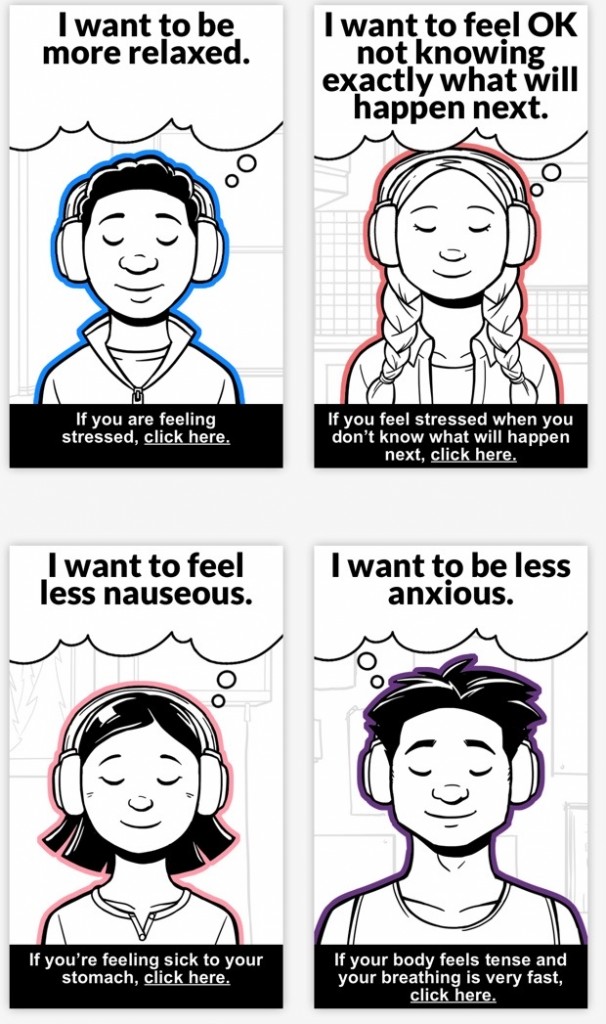
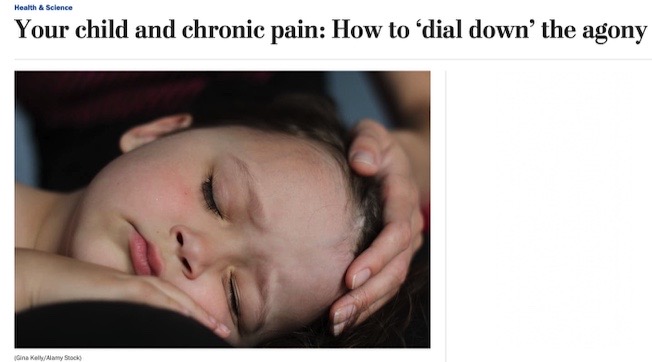
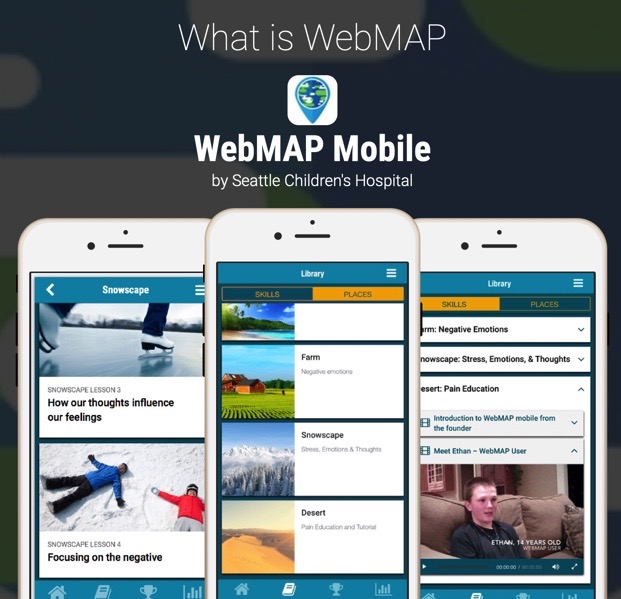


Adherence to Medical Treatment: Advice for Parents


